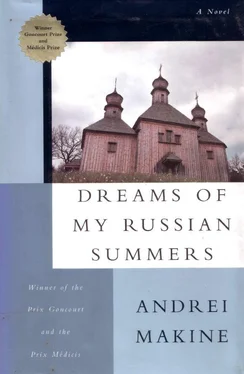Suddenly I was gasping for breath; I choked myself with my own words; I had too much to say.
After a moment of silence my grandmother nodded gently and said, with absolutely sincerity, "I'm delighted you know your history so well!"
Yet in her voice, full of conviction, I thought I could detect the echo of an unconscious thought: "It is good to know history. But when I spoke of Isabeau and the allée des Arbalétriers, and that autumn night, I had something different in mind…"
She bent over her task, making little thrusts with her needle, precise and regular. I walked through the apartment, went down into the street. A train whistle sounded in the distance. Its tone, softened by the warm air of the evening, had something of a sigh, a lament about it.
Between the apartment block where Charlotte lived and the steppe there was a kind of little wood, very dense, even impenetrable: thickets of brambles, the claws of hazel branches, collapsed trenches full of nettles. And even if we managed to get through these natural obstacles in the course of our games, others, those made by man, barred the way: rows of barbed wire entanglements, the rusty crossed bars of antitank barriers… This place was known as the "Stalinka," after the name of the defensive line built there during the war. They were afraid that the Germans might get that far. But the Volga and, above all, Stalingrad had halted them… The line had been dismantled; what was left of the war materials had ended up abandoned in this wood, which had inherited its name. The "Stalinka," the inhabitants of Saranza would call it, and thus their town seemed to become involved in the great deeds of history.
It was said that the inside of the wood was mined. This deterred even the boldest among us who might have wanted to venture into this no-man's-land that hugged its rusted treasures to itself.
It was beyond the thickets of the Stalinka that the narrow-gauge railway passed; it was like a miniature railway, with a little locomotive, all black with soot, with little trucks as well and, as in an optical illusion, the driver dressed in a grease-stained jersey: an apparent giant.
leaning out of the window. Each time it was about to cross one of the roads that trailed off toward the horizon, the locomotive emitted its cry, half tender, half plaintive. Doubled by its echo, this signal sounded like the call note of a cuckoo. "The Kukushka" we called it, with a wink, when we caught sight of this train on its narrow track, overrun with dandelion and chamomile…
It was its voice that guided me that evening. I walked round the thickets at the edge of the Stalinka, I saw the last train in a blur slipping into the warm half-light of the dusk. Even this little train gave off the inimitable slightly piquant smell of railways that imperceptibly summons one to go on long journeys. From the distance, from the blue-tinted mist of the evening, I heard a melancholy coo-coo-oo floating on the air. I put my foot on the rail, which was gently vibrating from the vanished train. The silent steppe seemed to be awaiting some action, some movement from me.
"How good it was before," a wordless voice said within me. "I believed the Kukushka went off to an unknown destination, to countries not shown on any map, toward snowcapped mountains, toward a nocturnal sea where the paper lanterns on the boats mingled with the stars. Now I know that this train goes from the Saranza brickworks to the station where its trucks are unloaded. Two or three kilometers in all. Some journey! Yes, now that I know this, I'll never again be able to believe that these rails are endless and this evening unique; with the strong scent from the steppe, the immense sky, and my inexplicable and strangely necessary presence here beside this line with its cracked sleepers; at this precise moment, with that coo-coo-oo echoing in the violet air. Once upon a time everything seemed so natural…"
That night, before going to sleep, I remembered having finally learned the meaning of the enigmatic formula on the menu for the banquet in honor of the tsar: "Roast bartavels and ortolans, garnished with truffles." Yes, I knew now that they were both game birds, much prized by gourmets. A delicate, tasty, rare dish, but nothing more. In vain I repeated "bartavels and ortolans," as before. The magic that had once filled my lungs with the salt air of Cherbourg had faded. And with a hesitant despair I murmured softly to myself, staring wide-eyed into the darkness, "Part of my life is now behind me!
From then onward we talked but said nothing. Coming between us we could see the screen that is formed by those smooth words, those echoes of the everyday we give voice to; the verbal liquid with which we feel obliged, without knowing why, to fill the silence. With stupefaction I discovered that talking was in fact the best way of saying nothing about the essential. Whereas to express it one would have to articulate words in quite a different way, whisper them, weave them into the sounds of evening, into the rays of the sunset. Once again I sensed in myself the mysterious gestation of that language so different from words blunted by use, a language in which I could have said softly, meeting Charlotte's gaze, "Why does my heart miss a beat when I hear the distant call of the Kukushka? Why does an autumn morning in Cherbourg a hundred years ago, yes, a moment I have never lived through, in a town I have never visited, why do its lights and breeze seem to me more alive than the days of my real life? Why does your balcony no longer float in the mauve air of the evening above the steppe? The transparency of dreams that once enveloped it is now broken like an alchemist's flask. And the glass splinters grate together to keep us from talking as we used to… Are not your memories, which I now know by heart, a cage that holds you prisoner? Is not our life simply the daily transformation of the fluid and warm present into a collection of frozen memories, like butterflies crucified on their pins in a dusty glass case? And why then do I sense that I would without hesitation exchange this whole collection for the unique sharp taste left on my lips by that little imaginary silver dish in that illusory café at Neuilly? For a single mouthful of Cherbourg's salt breeze? For a single cry of the Kukushka recalled from my childhood?"
But we continued to pour useless words and hollow remarks into the silence, as if into a sieve of the Danaids: "It's hotter than yesterday! Gavrilych is drunk again… The Kukushka hasn't gone past this evening… There's a fire over there on the steppe, look! No, it's a cloud… I'll make some more tea… Today at the market they were selling watermelons from Uzbekistan…"
The unsayable! It was mysteriously linked, I now understood, to the essential. The essential was unsayable. Incommunicable. And everything in this world that tortured me with its silent beauty, everything that needed no words, seemed to me essential. The unsayable was essential.
This equation created a kind of intellectual short circuit in my head. Its conciseness led me that summer to a terrible truth: "People speak because they are afraid of silence. They speak mechanically, whether aloud or to themselves. They are intoxicated by this vocal gruel that ensnares every object and every being. They talk about rain and fine weather; they talk about money, about love, about nothing. And even when they are talking about their most exalted love, they use words uttered a hundred times, threadbare phrases. They talk for the sake of talking. They seek to exorcise silence…"
The alchemist's vessel was broken. Though conscious of the absurdity of our words, we continued our humdrum dialogue: "I think it's going to rain. Look at that big cloud. No, it's a fire on the steppe… That's funny, the Kukushha has gone past earlier than usual… Gavrilych… The tea… At the market…"
Читать дальше












